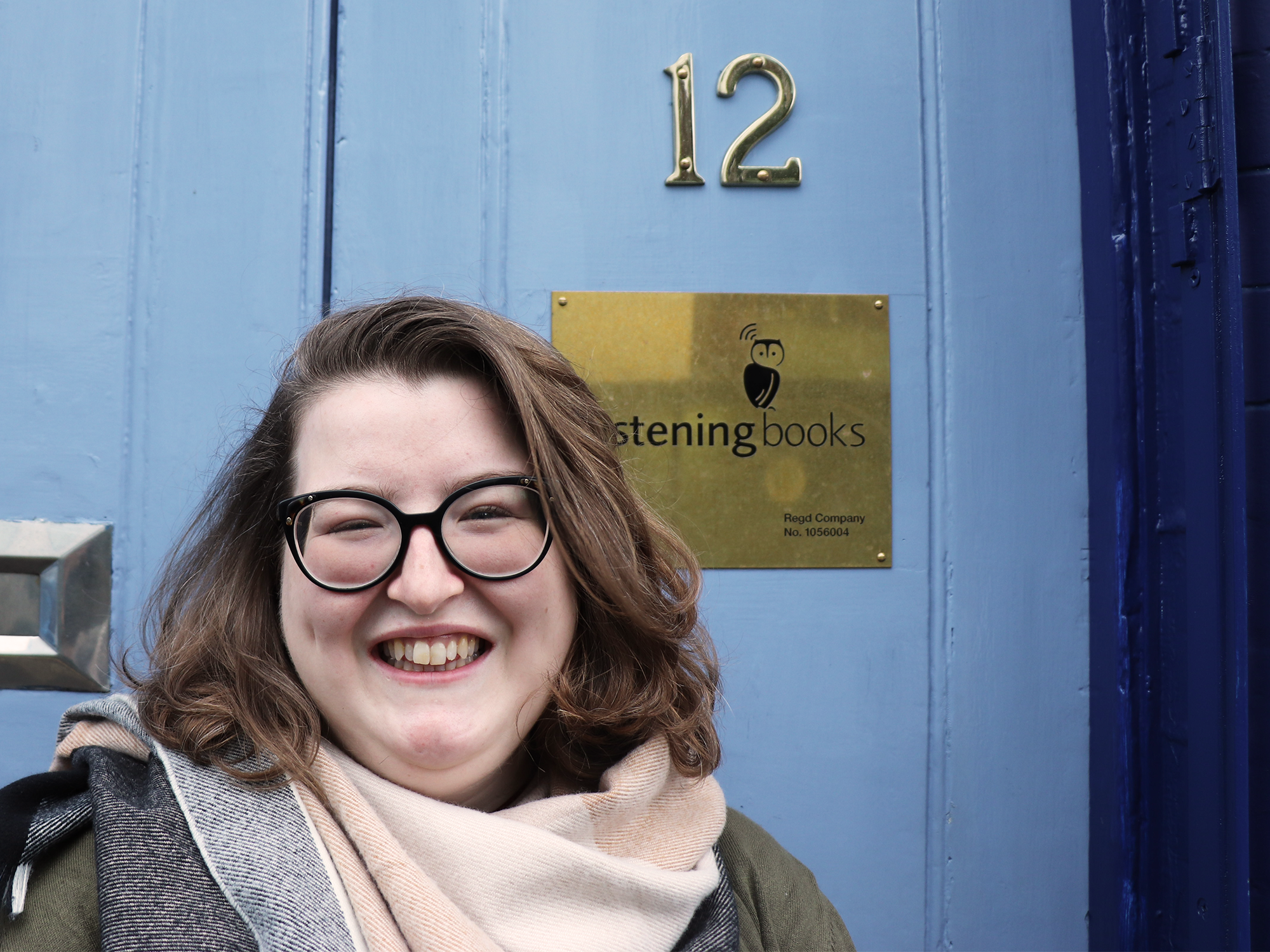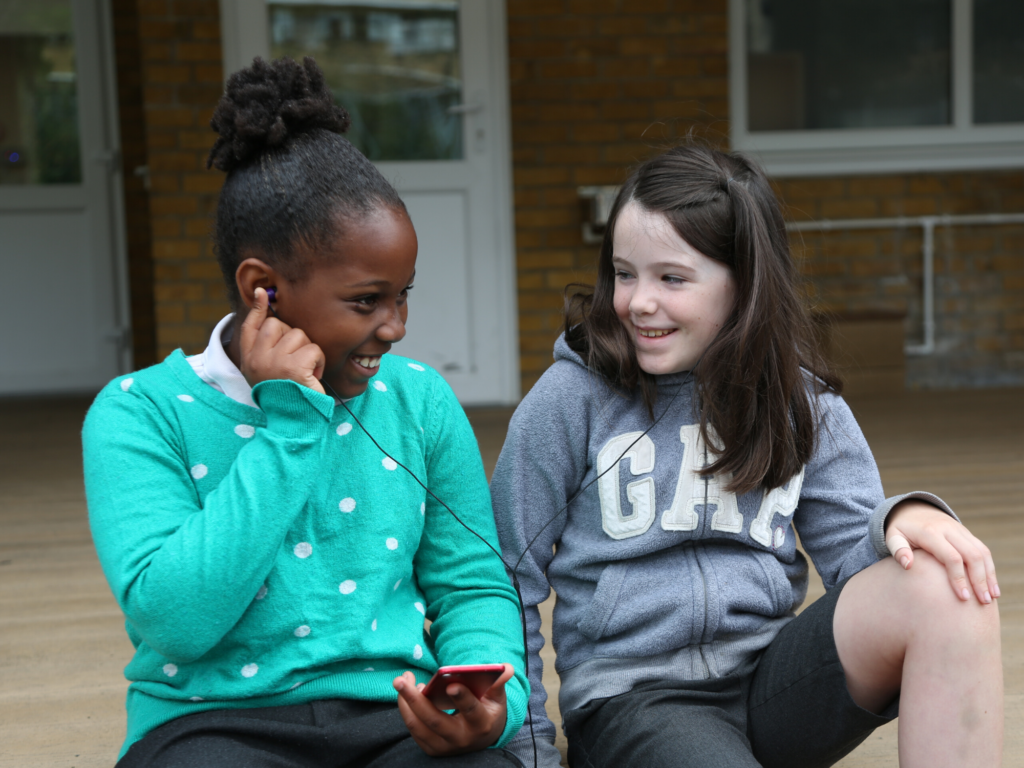In the current climate, distractions and finding ways to spend time when at home, for everyone, has become a topic of mainstream conversation in a way I’ve never seen it before.
But for many people living in the disability community, these have been ongoing for many years.
Reading has always been one of my biggest comforts, but when I developed fatigue, reading for pleasure very much became something that I lost – and it felt like I was losing part of my identity. As the years went by, I was able to read, online, mostly for work or as I scrolled, but it came quite difficult to force away from the screen and pick up a book.
I’ve always struggled with audiobooks, as I process information best by reading, so bar listening to Harry Potter or podcasts, listening wasn’t something that I gravitated to.
But it’s important conversations around what reading is include reading of all kinds: be that holding a book, using an e-reader, or listening to a book. And that’s where today’s interview comes in.
I was delighted to have the opportunity to speak with Abigail Jaggers, Membership and Marketing Assistant for Listening Books, to learn more about their organisation, which offers access to audiobooks for people who find it difficult to read the printed word.
Hi Abigail! Can you tell us a bit about Listening Books?
Listening Books is a charity audiobook lending service. We offer audiobooks sent through the post and also as online downloads and streams, so we can offer the service nationally across the UK. Basically, it works like a national library – once you sign up we give you a membership number and a password that you can use to login and request CDs sent direct to your door, or to borrow audiobooks online and listen to them on your smartphone or tablet.
How do your memberships work, who are they for, and what do people have access to with it?
Listening Books offers memberships to anyone living in the UK who has a print impairment. This can be an illness, a disability, a learning difficulty or a mental health condition. Also, if you do find reading or holding books inaccessible for any reason but don’t think that reason fits into any of those categories, we may still be able to offer you a membership so just get in touch.
We offer a few different types of memberships. The most popular is our online membership, which is £20 a year, and means you can download or stream two audiobooks at a time, up to a maximum of ten a week every week. Just download our library app, sign in, and browse for audiobooks you’d like to listen to! They automatically return on the app after a certain period of time, so you don’t need to worry about remembering to do that.
We also offer a postal membership, which just means that you get access to our CD service. This is £35 a year. The way this works is you choose a list of audiobooks you’d like to listen to from our website, and then when they are available our system automatically posts them out to you in an envelope that is pre-addressed so you can also use it to return the CDs to us. You can have up to 4 CDs at any one time, and we don’t have a limit on how long you can keep them so there are no late fees. As soon as you send a CD back to us our system will send you another one.
We also know that illnesses, disabilities and learning difficulties that affect reading can mean that these kinds of costs are difficult to cover. So, if you’re eligible to join but the price would be a barrier then we can offer you a completely free membership.
What are the benefits of audiobooks for people living with long-term health conditions?
Oh, there’s not enough space to list them all!
Honestly, it really depends on how your long-term health condition affects you and how you like to spend your leisure time. I would say a major benefit is just relaxation and escapism, though. You can plug in your headphones, or connect to your bluetooth speaker, and just lie back and allow yourself to be taken into a story that you can totally immerse yourself in without the difficulty of thinking about pacing yourself with holding up heavy books, or spending time decoding print.
Having a long-term health condition can also be quite isolating, but audiobooks are really comforting. Having a voice there telling a story fills that space that you might otherwise fill with TV or screens. Plus, listening to an audiobook I’ve read before helps lull me to sleep.
Another one I really believe in is laughter. This is especially true if you have a long-term mental illness like depression or anxiety, or if a physical condition has affected your mental health. The difference between reading a funny book and listening to a funny audiobook is like the difference between watching a comedy show alone or in a crowd. It’s still funny, of course, but there’s another voice there that makes it easier to laugh along. I’ve found from my own experience that it’s quite difficult to have a panic attack while laughing, so if I’m struggling with something I’ll often put on a funny audiobook and just let the laughter take over for a bit.
Why do you think there’s still a stigma attached to audiobooks as opposed to ‘reading’ a book?
I’ve seen this comment quite a lot, surprisingly! There’s lots of snobbery attached to reading, although I think that’s because so many people are introduced to reading regularly at school. Even the best teachers have to help students pass exams, and exams put a really intense pressure on reading ‘proper’ books and finding the ‘correct’ meaning.
The good news is that this is all rubbish. Reading isn’t a competition and you can’t win by reading certain books in a certain format. There’s been research that has shown that the same parts of the brain are used whether you’re reading print or listening to something read aloud. You comprehend the words just the same. There’s no reason to try and force yourself to read or hold a print book just to appease people who think they know the only true way to read.
What are some of your most popularly downloaded books?
Our most popular audiobooks mostly tend to be quite similar to the bestseller lists. In the past couple of years the audiobooks our members have borrowed a lot are David Walliams titles, the Game of Thrones series by George R. R. Martin, and Eleanor Oliphant is Completely Fine. More recently, Michelle Obama’s autobiography, Becoming, has also been very popular. She narrates the audiobook, so it’s a really immersive experience.
Overall, the Harry Potter audiobooks are always very popular, which is good as Stephen Fry is our charity’s patron! I think whatever age you are people love to re-read those books. They’re so comforting to listen to. We’ve bought lots of extra copies of them so our members can usually always borrow a copy whenever they want. I think they’re going to continue to be popular in the future as well.
At the beginning of every month I update the Listening Books Blog with the top 10 audiobook downloads for the previous month. I hope that having this list available means that, despite Listening Books not being a physical library that members can visit, they can see what others are listening to and discuss what they borrowed and enjoyed that month if they like!
Are your audiobooks often read by a single narrator, or do you also have other voice actors reading the different characters
That really depends on what the publishers are recording. We buy 99% of our audiobooks from major publishers, so it depends on their editorial decisions! We have lots of both types in the catalogue.
For me, I prefer a mix. I like a single narrator if the story is from a single perspective, or if the story is written in third person, but if I’m reading, say, a crime novel with alternating chapters for a man and woman character then I like it when there are two narrators. Lots of people have different preferences, though. Some narrators are so good at embodying different perspectives that it doesn’t matter.
My favourite thing is when celebrities read their own autobiographies. It feels so much more personal. Eddie Izzard narrated his autobiography and went off on so many tangents that the audiobook is essentially a different experience from the book!
What advice would you give to people who are starting to listen to audiobooks for the first time?
There are lots of different ways to get into audiobooks. I would say if you’re unsure about it then try listening to a book you have read before and know you like so you can get a feel for the experience. Children’s books and radio dramatisations like BBC Radio 4’s Agatha Christie adaptations are especially good for this. Plus, they’re usually a bit shorter, so if you don’t enjoy it then it isn’t the end of the world.
I also find that I like to do something while I’m listening. Nothing distracting, just a task I can do on autopilot like washing dishes, a colouring book, or knitting. Whether you do this or what you do is obviously dependent on how much you can do with a long-term condition, but especially at first, I find it helped to keep my mind from wandering.
Can you tell us a little bit about your Sound Learning library?
I’m so glad you asked about this, because I think this is something that really makes Listening Books unique.
We have our own in-house studios, and every year we record about 30 audiobooks. These are all children and YA books that publishers haven’t made available in audio. They can be anything that helps to support younger people who are still at school or in alternative education – from books about how to look after your mental health while growing up, to full cast recordings of plays on the curriculum. I’m actually really excited that we’re recording a version of When Hitler Stole Pink Rabbit at the moment. I loved that book as a child, and I think it’s really important that everyone can access the story.
Do you have to record the vast majority of your audiobook offerings yourself? How open have you found commercial publishers to be when it comes to requesting access to their audiobooks for your members?
Apart from our Sound Learning books, we don’t record any audiobook titles ourselves. We buy audiobooks from most of the major publishers, so what you’re listening to will be the same text, narrator and quality as you get if you were buying audiobooks or had a subscription service elsewhere.
We have a great relationship with most commercial publishers, and we buy hundreds of audiobooks from them every year. Sometimes, if an audiobook is especially popular, we will go on to buy more of the same title so that members don’t have long waits for books that are really in-demand. We love working with publishers to provide a really wide variety of titles for our members, and it’s really important to us that we can provide the best possible range. Just because you may find that print books aren’t accessible doesn’t mean you shouldn’t be able to read the same stories!
Unfortunately, we aren’t always able to buy in every audiobook we would like. This is sometimes because some of them are offered as exclusives to other services, or sometimes because we are still in discussions with a publisher about buying their titles. We’re always working really hard to change this so that we can buy the widest possible range of audiobooks we can.
How has your offering adapted as technology has changed?
That’s a great question!
Listening Books has been going since 1959, so we’ve been through lots of technological changes. We used to send out audiobooks via reel-to-reel tape recordings! Can you imagine the postage costs?!
I’d say probably the biggest change has been how easy it is to listen to audiobooks now. We started offering a streaming service in 2005, although you still had to listen to them through the website. In 2010 we started offering a download service as well through OverDrive, which is a platform that’s used by libraries all over the world. We still use this now, and you can get the app on your smartphone and listen literally wherever you are.
As technology continues to change we hope that this will make audiobooks even easier to access. We’re always trying to make our service as accessible as possible, although maybe we’ll draw the line at something too sci-fi like beaming them directly into your brain!
Three Audiobooks To Get You Started:
Harry Potter Series – J. K. Rowling, narrated by Stephen Fry
Okay, so I’m cheating on the first go, as the whole series is seven books! I’ve been listening to the Harry Potter audiobooks all my life (well, since they were first published on audio cassette anyway) and I can fully recommend them as a great place to get started with audiobooks. The stories and characters are engrossing, but Stephen Fry’s narration really takes it to another level. I still listen to them when I’m feeling low as the audiobook equivalent of a comfort blanket.
How to Be Champion – written and read by Sarah Millican
This sort-of memoir is really made by being narrated by the author because Sarah Millican is just as funny reading this book as she is during her stand up. Before she was a comedian she used to be an audiobook producer and this experience shines through. Plus, she reveals some touching anecdotes about her life as well. If you’re anything like me, you won’t want to stop listening to sleep.
Murder on the Orient Express – BBC Radio 4 adaptation of the Agatha Christie Story
This is a full cast dramatization of the story, which makes it a short and easy audiobook to take in if you’re just starting. It is also a classic murder mystery for a reason – the plot is fascinating and Hercule Poirot works to discover what happened with his typical idiosyncrasies. If you don’t think that 7+ hours of an audiobook would be doable on your first try then this is the best place to start.
A huge thank you to Abigail for taking the time to answer my questions! You can learn more about Listening Books on their website.
If you enjoy my content, the biggest way you can support me is by subscribing to my newsletter.





1 thought on “Listening Books: Making Reading Accessible”
Audiobooks are very useful because many people suffer from physical and mental disabilities and it is good for them to increase their knowledge and expand their imagination.